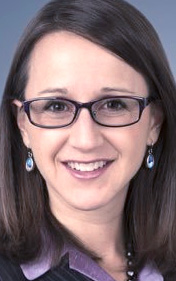

 My thesis is simple: the way we protect privacy today is broken and cannot be fixed without a radical change in direction. My full argument is long; I submitted it to the NTIA's request for comments on privacy. Here's a short summary. For almost 50 years, privacy protection has been based on the Fair Information Practice Principles (FIPPs). There are several provisions...
My thesis is simple: the way we protect privacy today is broken and cannot be fixed without a radical change in direction. My full argument is long; I submitted it to the NTIA's request for comments on privacy. Here's a short summary. For almost 50 years, privacy protection has been based on the Fair Information Practice Principles (FIPPs). There are several provisions...
 The development of the Internet has arrived at a new Crossroads. The growing Internet Governance complexity is leading also to a higher level of confusion on how the digital future should be shaped. The French president Emanuel Macron and UN Secretary General Antonio Guterres will open both the Paris Peace Forum and the 13th IGF where Internet Governance is a key issue. Is the time ripe for a "New Deal" on Internet Governance? And which stakeholder should bear the primary responsibility for the normative framing of the key challenges internet governance is facing?
The development of the Internet has arrived at a new Crossroads. The growing Internet Governance complexity is leading also to a higher level of confusion on how the digital future should be shaped. The French president Emanuel Macron and UN Secretary General Antonio Guterres will open both the Paris Peace Forum and the 13th IGF where Internet Governance is a key issue. Is the time ripe for a "New Deal" on Internet Governance? And which stakeholder should bear the primary responsibility for the normative framing of the key challenges internet governance is facing?
 Two months ago, the Trump White House published its National Cyber Strategy. It was followed a few days ago with the release of its draft NSTAC Cybersecurity "moonshot." The Strategy document was basically a highly nationalistic America-First exhortation that ironically bore a resemblance to China's more global two-year-old National Cybersecurity Strategy.
Two months ago, the Trump White House published its National Cyber Strategy. It was followed a few days ago with the release of its draft NSTAC Cybersecurity "moonshot." The Strategy document was basically a highly nationalistic America-First exhortation that ironically bore a resemblance to China's more global two-year-old National Cybersecurity Strategy.
 Last week during the ICANN meeting in Barcelona I attended a short presentation from the Internet Watch Foundation (IWF). Their mission is pretty simple: ...eliminate child sexual abuse imagery online. Fortunately, the presentation I was at did not include any of the actual material (which would have been illegal anyway) but even without seeing any of it the topic is one that I think most people find deeply disturbing.
Last week during the ICANN meeting in Barcelona I attended a short presentation from the Internet Watch Foundation (IWF). Their mission is pretty simple: ...eliminate child sexual abuse imagery online. Fortunately, the presentation I was at did not include any of the actual material (which would have been illegal anyway) but even without seeing any of it the topic is one that I think most people find deeply disturbing.
 This past Saturday, a self-professed neo-Nazi massacred eleven worshipers at synagogue services in Pittsburgh. The killer was reported to have lived on and was incented by an "Over the Top (OTT)" service purposely established to facilitate extremist activities known as Gab. Within hours, the cloud service providers hosting their services announced they would no longer provide hosting services. Presumably, the threat of both potential civil litigation liability among other penalties, as well as adverse publicity, provided the motivation.
This past Saturday, a self-professed neo-Nazi massacred eleven worshipers at synagogue services in Pittsburgh. The killer was reported to have lived on and was incented by an "Over the Top (OTT)" service purposely established to facilitate extremist activities known as Gab. Within hours, the cloud service providers hosting their services announced they would no longer provide hosting services. Presumably, the threat of both potential civil litigation liability among other penalties, as well as adverse publicity, provided the motivation.
 When the Internet outgrew its academic and research roots and gained some prominence and momentum in the broader telecommunications environment it found itself to be in opposition to many of the established practices of the international telecommunications arrangements and even in opposition to the principles that lie behind these arrangements.
When the Internet outgrew its academic and research roots and gained some prominence and momentum in the broader telecommunications environment it found itself to be in opposition to many of the established practices of the international telecommunications arrangements and even in opposition to the principles that lie behind these arrangements.
Accessing Whois information and acting on a litigious domain name is becoming a nightmare for law enforcement agencies. Law enforcement agencies must have an access to the information provided by registrants in the Whois database and, in specific cases, have authority to act FAST on a domain name. The EU has a solution for this and it's coming in 2020.
 Next Monday, 29 October, most of the formal representatives of the world's nations will convene for three weeks to collectively consider the most significant developments in global network communications networks and services, and make multilateral adjustments in a treaty instrument signed by almost every country at the end. They will also elect heads of the various International Telecommunication Union (ITU) secretariats and permanent bodies for the next four years.
Next Monday, 29 October, most of the formal representatives of the world's nations will convene for three weeks to collectively consider the most significant developments in global network communications networks and services, and make multilateral adjustments in a treaty instrument signed by almost every country at the end. They will also elect heads of the various International Telecommunication Union (ITU) secretariats and permanent bodies for the next four years.
 My story begins in ancient times when dinosaurs ruled the earth. It was a time when you could download a movie onto your desktop computer through your 56k dial-up connection if you had a few days. It was a time when more people were on the Minitel in France than on the Internet globally and when the Republic of Korea could fit all of its internet users into one small hotel room. I know because I met them all in that room.
My story begins in ancient times when dinosaurs ruled the earth. It was a time when you could download a movie onto your desktop computer through your 56k dial-up connection if you had a few days. It was a time when more people were on the Minitel in France than on the Internet globally and when the Republic of Korea could fit all of its internet users into one small hotel room. I know because I met them all in that room.
 The nonprofit Alliance for Safe Online Pharmacies (ASOP Global) presented its annual Internet Pharmacy Safety E-Commerce Leadership Award to .DK Hostmaster at the 2018 ICANN63 today in Barcelona, Spain. The domain name administrator for Denmark, DK Hostmaster, was selected for the award based on their commitment to ensuring citizen safety by maintaining transparent WHOIS data, proactively enforcing identity accuracy policies to increase consumer trust and safety online.
The nonprofit Alliance for Safe Online Pharmacies (ASOP Global) presented its annual Internet Pharmacy Safety E-Commerce Leadership Award to .DK Hostmaster at the 2018 ICANN63 today in Barcelona, Spain. The domain name administrator for Denmark, DK Hostmaster, was selected for the award based on their commitment to ensuring citizen safety by maintaining transparent WHOIS data, proactively enforcing identity accuracy policies to increase consumer trust and safety online.